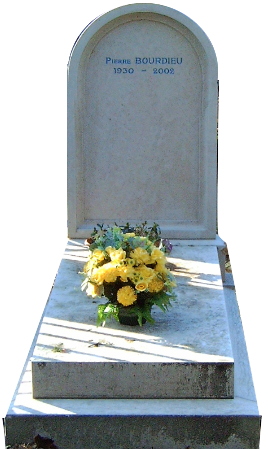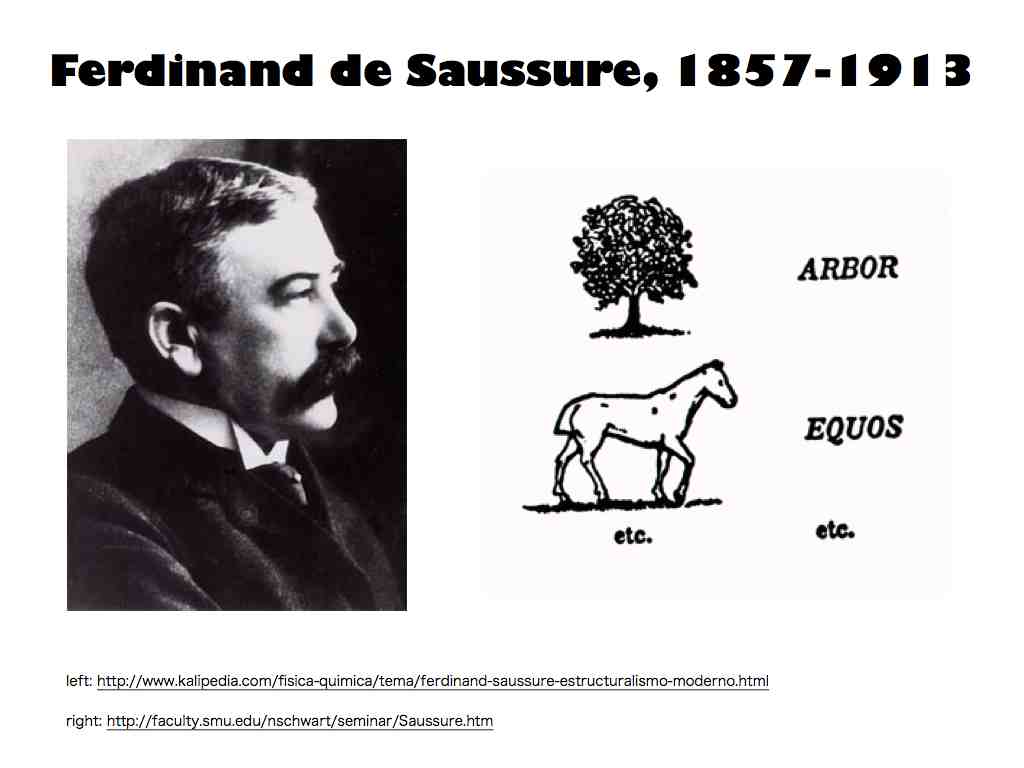ピエール・ブルデュ
Pierre Bourdieu, 1930-2002

Bourdieus
Grab auf dem Friedhof Père Lachaise
ピエール・ブルデュ
Pierre Bourdieu, 1930-2002

Bourdieus
Grab auf dem Friedhof Père Lachaise
ピエール・ブルデュー (Pierre Bourdieu、1930年8月1日 - 2002年1月23日)は、フランスの社会学者、哲学者。コレージュ・ド・フランス名誉教授。哲学から文学理論、社会学、人類学まで研究分野は幅広い。著 書『ディスタンクシオン』が有名。文化資本、社会関係資本、象徴資本の用語や、ハビトゥス (Habitus)、界、象徴的暴力(Symbolic violence)などの 概念で知られる。
■ハビトゥス(ウィキペディアの説 明)
"Habitus described as “a system of structure, structuring dispositions…which is constituted in practice and is always oriented towards practical functions” In other words, the habitus could be understood as a structure of the mind and emotions characterized by a set of acquired schemata, sensibilities, dispositions and taste," Scott, John & Marshall, Gordon (eds) A Dictionary of Sociology, Oxford University Press, 1998. [Habitus, by Wikipedia]
「「構造、構造化する傾向のシステム…実践の中で構成され、常に実践的な機能に向けられている」
と表現されるハビトゥス。つまり、ハビトゥスは、一連の習得したスキーマ、感性、傾向、嗜好によって特徴づけられる、心や感情の構造として理解することが
できる。」
| Theory of habitus |
ハビトゥス論 |
| Bourdieu developed a theory of
the action, around the concept of habitus, which exerted a considerable
influence in the social sciences. This theory seeks to show that social
agents develop strategies which are adapted to the structures of the
social worlds that they inhabit. These strategies are unconscious and
act on the level of a bodily logic. In Bourdieu's perspective, each relatively autonomous field of modern life (such as economy, politics, arts, journalism, bureaucracy, science or education), ultimately engenders a specific complex of social relations where the agents will engage their everyday practice. Through this practice, they develop a certain disposition for social action that is conditioned by their position on the field.[iv] This disposition, combined with every other disposition the individual develops through their engagement with other fields operating within the social world, will eventually come to constitute a system of dispositions, i.e. habitus: lasting, acquired schemes of perception, thought and action. Habitus is somewhat reminiscent of some preexisting sociological concepts, such as socialization, though it also differs from the more classic concepts in several key ways. Most notably, a central aspect of the habitus is its embodiment: habitus does not only, or even primarily, function at the level of explicit, discursive consciousness. The internal structures become embodied and work in a deeper, practical and often pre-reflexive way. An illustrative example might be the 'muscle memory' cultivated in many areas of physical education. Consider the way we catch a ball—the complex geometric trajectories are not calculated; it is not an intellectual process. Although it is a skill that requires learning, it is more a physical than a mental process and has to be performed physically to be learned. In this sense, the concept has something in common with Anthony Giddens' concept of practical consciousness. The concept of habitus was inspired by Marcel Mauss's notion of body technique and hexis, as well as Erwin Panofsky's concept of intuitus. The word habitus itself can be found in the works of Mauss, as well as of Norbert Elias, Max Weber, Edmund Husserl, and Alfred Schutz as re-workings of the concept as it emerged in Aristotle's notion of hexis, which would become habitus through Thomas Aquinas's Latin translation.[20] |
ブルデューは、社会科学に大きな影響を与えたハビトゥス
(habitus)の概念を中心に、行為論を展開した。この理論は、社会的主体が、彼らが住む社会的世界の構造に適応した戦略を開発することを示そうとす
るものである。これらの戦略は無意識的であり、身体的な論理のレベルで作用する。 ブルデューの視点によれば、現代生活の比較的自律的な各分野(経済、政治、芸術、ジャーナリズム、官僚、科学、教育など)は、最終的に特定の社会関係の複 合体を生み出し、そこで主体は日常の実践を行うことになる。この実践を通じて、彼らは場における自分の位置によって条件づけられた社会的行動に対するある 種の気質を発達させる[iv] この気質は、社会世界の中で活動する他の場との関わりを通じて個人が発達させる他のあらゆる気質と組み合わさって、最終的に気質のシステム、すなわちハビ トゥス、すなわち知覚、思考、行動に関する持続的で獲得されたスキームを構成することになる。 ハビトゥスは、社会化のような既存の社会学的概念をいくらか想起させるが、より古典的な概念とはいくつかの重要な点において異なっている。最も注目すべき は、ハビトゥスの中心的な側面がその体現にあることである。ハ ビトゥスは、明示的な言説的意識のレベルにおいてのみ、あるいは主として機能 するのではない。ハビトゥスは、明示的な言説的意識のレベルにおいてのみ、あるいは主として 機能するわけではない。内部構造は体現され、より深く、実践的で、しばしば事前に反省的な 方法で機能するようになるのである。例えば、体育の多くの分野で培われている「筋肉の記憶」がその例です。複雑な幾何学的軌道は計算されたものではなく、 知的なプロセスでもありません。複雑な幾何学的軌道を描くキャッチボールは計算されたものではなく、知的なプロセスではありません。これは学習が必要なス キルではありますが、精神的というよりは肉体的なプロセスであり、学習するには肉体的に実行する必要があります。この意味で、この概念はアンソニー・ギデ ンズの実践的意識という概念と共通するものがある。 ハビトゥスの概念は、マルセル・モースの身体技法やヘクシスの概念、エルヴィン・パノフスキーの直観の概念に触発されたものである。ハビトゥスという言葉 自体は、アリストテレスのヘクシスの概念に現れた概念の再制作として、モースやノルベルト・エリアス、マックス・ウェーバー、エドモンド・フッサール、ア ルフレッド・シュッツの著作で見ることができ、それはトマス・アクイナスのラテン語訳によってハビトゥスとなるものであった[20]。 |
| Disposition "Disposition"—a key concept in Bourdieu's work—can be defined as a sense of the game; a partly rational but partly intuitive understanding of fields and of social order in general, a practical sense, a practical reason, giving rise to opinions, tastes, tone of voice, typical body movements and mannerisms and so on. The dispositions constitutive of habitus are therefore conditioned responses to the social world, becoming so ingrained that they come to occur spontaneously, rather like 'knee-jerk' opinions. It follows that the habitus developed by an individual will typify his position in the social space. By doing so, social agents will often acknowledge, legitimate, and reproduce the social forms of domination (including prejudices) and the common opinions of each field as self-evident, clouding from conscience and practice even the acknowledgment of other possible means of production (including symbolic production) and power relations. Though not deterministic, the inculcation of the subjective structures of the habitus can be observed through statistical data, for example, while its selective affinity with the objective structures of the social world explains the continuity of the social order through time. As the individual habitus is always a mix of multiple engagements in the social world through the person's life, while the social fields are put into practice through the agency of the individuals, no social field or order can be completely stable. In other words, if the relation between individual predisposition and social structure is far stronger than common sense tends to believe, it is not a perfect match. Some examples of his empirical results include showing that, despite the apparent freedom of choice in the arts, people's artistic preferences (e.g. classical music, rock, traditional music) strongly tie in with their social position; and showing that subtleties of language such as accent, grammar, spelling and style—all part of cultural capital—are a major factor in social mobility (e.g. getting a higher-paid, higher-status job). Sociologists very often look at either social laws (structure) or the individual minds (agency) in which these laws are inscribed. Sociological arguments have raged between those who argue that the former should be sociology's principal interest (structuralists) and those who argue the same for the latter (phenomenologists). When Bourdieu instead asks that dispositions be considered, he is making a very subtle intervention in sociology, asserting a middle ground where social laws and individual minds meet and is arguing that the proper object of sociological analysis should be this middle ground: dispositions. |
気質 ブルデューの研究における重要な概念である「気質」は、ゲームの感覚と 定義することができる。分野と社会秩序全般に関する、一部は合理的だが一 部は直観的な理解、実用的な感覚、実用的な理由、意見、好み、声の調子、典型的な身体の動きや作法などを生じさせるものである。したがっ て、ハビトゥスを構成する気質は、社会的世界に対する条件付きの反応であり、「膝を打つ」意見のように、自然に起こるようになるように深く染み込んでい く。個人によって開発されたハビトゥスは、社会空間における彼の位置を典型化する ことになる。そうすることで、社会的主体はしばしば、(偏見を含む)支配の社会的形態と各界の通説を自明のものとして認め、正当化し、再生産し、良心と実 践から、(象徴的生産を含む)他の生産手段と権力関係の可能性を認めることすら曇らせてしまうのである。 決定論的なものではないが、ハビトゥスの主観的な構造の植え付けは、例えば、統計的なデータを通じて観察することができる。一方、社会世界の客観的な構造 との選択的な親和性は、時間を通じて社会秩序の継続性を説明する。個人のハビトゥスは常にその人の人生を通じての社会的世界における複数の関わりの混合物 であり、一方、社会的場は個人の主体性を通じて実践されるので、いかなる社会的場も秩序も完全に安定することはありえないのである。つまり、個人の素質と 社会構造との関係が、常識的に考えられがちなよりもはるかに強いとすれば、それは完全な一致ではない。 また、アクセント、文法、スペル、スタイルといった言語の微妙な差異が、文化資本の一部であり、社会的移動(例えば、より高給で地位の高い仕事に就くこ と)の主要な要因であることを示すなど、実証的な結果をいくつか挙げています。 社会学者はしばしば、社会的法則(構造)か、あるいはこれらの法則が刻み込まれている個人の心(agency)のどちらかに注目する。前者が社会学の主要 な関心事であるべきだと主張する人々(構造主義者)と、後者についても同じように主張する人々(現象学者)の間で、社会学的な議論が繰り広げられてきたの である。ブルデューが「気質」を考察することを求めたとき、彼は社会学に巧妙な介入を行い、社会法則と個人の心が出会う中間領域を主張し、社会学的分析の 適切な対象はこの中間領域であるべきだと主張しているのである:「気質」。 |
| https://en.wikipedia.org/wiki/Pierre_Bourdieu |
https://www.deepl.com/ja/translator |
■modus operandi をとおしてゴシック建築が発展


ゴシック(ゴチック)建築で著名なミラノ
大聖堂(Duomo di Milano)
・ゴシック建築が発展することは、スコラ哲学の成熟の単純な表象関係ではない。「スコラ哲学 者、建 築家、および彫刻家、ガラス絵師、木彫師など職人の間に伝達され共有されたある種の心的な慣習があり、そこであの荘厳なゴシック大聖堂がつぎつぎに建立さ れたのだと考える」(p.45)。[ref., p.45]
Ref. Gothic architecture and scholasticism / by Erwin Panofsky, New York : Meridian Books, 1957.
●ブルデュ論
ピエール・ブルデュー(Pierre Bourdieu, 1930-2002)[ウィキペディアより]
1930 フランスのピレネー=アトランティック県(Pyrénées-Atlantiques) ダンガン村(Denguin)で生誕。
1951 リセ・ルイ=ル=グラン(Lycée Louis-le-Grand)を経て高等師範学校(ユルム校)で哲学を学ぶ
1954 高等師範学校を卒業。哲学のアグレガシオンを取得。
この年より、アルジェリアで対フランス独立戦争。(→「フランツ・ファノン」)
1955 リセ教師を務めていたが、陸軍に徴兵されアルジェリアに出征。
兵役期間終了後もアルジェリアに留まり、教師を務める。傍ら、アルジェリア社会の社会人
類学的なフィールドワークをおこなう。
1958 アルジェリア臨時独立政府発足。アルジェ大学に助手として着任
1964 フランス国立社会科学高等研究院 (École des hautes études en sciences sociales, ÉHÉSS) 教授
1981 コレージュ・ド・フランス教授
1988 『構造と実践――ブルデュー自身によるブルデュー』
1990 『ディスタンクシオン――社会的判断力批判(1・2)』
1991 『社会学の社会学』
1993 『話すということ――言語的交換のエコノミー』『資本主義のハビトゥス――アル ジェリアの矛盾』
1994 『美術愛好――ヨーロッパの美術館と観衆』
1995 『芸術の規則(1)』
1996 『芸術の規則 (2)』
1997 『ホモ・アカデミクス』
1999 『教師と学生のコミュニケーション』
著者紹介(アマゾンの紹介ページより):●ピエール・ブルデュー(Pierre Bourdieu)
1930-2002 年。社会学者。高等師範学校卒業。哲学教授資格を取得。リセの教員となるが、55
年アルジェリア戦争に徴兵。アルジェ大学助手、パリ大学助手、リール大学助教授を経て、64
年、社会科学高等研究院教授。教育・文化社会学センター(現在のヨーロッパ社会学センター)を主宰し学際的共同研究を展開。81
年コレージュ・ド・フランス教授。以後、逝去するまでコレージュ・ド・フランス社会学教授の地位にあった他、ヨーロッパ社会学研究所を主宰し、雑誌『社会
科学研究学報』と出版社レゾン・ダジールの責任者も務めた。20
世紀における最も影響力ある社会科学者のひとりであり、新自由主義に反対するグローバルな動員に関与する指導的な知識人のひとりだった。
著書『ディスタンクシオンI・II』『再生産』『芸術の規則I・II』『ホモ・アカデミクス』『市場独裁主義批判』『メディア批判』『パスカル的省察』
『科学の科学』『自己分析』『国家貴族』『介入』『男性支配』『知の総合をめざして』(いずれも藤原書店)ほか多数。●ジャン=クロード・パスロン(Jean-Claude
Passeron)
1930
年、フランスのニースに生まれる。父は農民。パリのアンリ四世校の準備級(カーニュ)を経て、高等師範学校を卒業する。哲学の第一級教員免許(アグレ
ジェ)を取得し、エピステモロジー、社会学を専門とする。社会科学高等研究院(EHESS)の研究主任、パリ第八大学教授、ナント大学教授を歴任。本邦訳
書や『再生産』(藤原書店、1991 年)、『社会学者のメチエ』(藤原書店、1994 年)、『遺産相続者たち』(藤原書店、1997
年)など、ピエール・ブルデューとの共著を多数刊行している。1991 年にLe raisonnement sociologique(Paris,
Nathan) で『社会学者のメチエ』(原著の刊行年は1973
年)とは異なる立場を表明する。︎●モニク・ド=サ
ン=マルタン(Monique de Saint Martin)
1940
年、フランスに生まれる。社会科学高等研究院(EHESS)の研究主任。ピエール・ブルデューの学位論文指導教官。エリート論、グランゼコールの研究、経
営者論を専門とする。本邦訳書や≪ L'excellence scolaire et les valeures du systeme
d'enseignement francais ≫ (Annales, Paris, janv.-mars 1970.);≪ Le
patronat ≫ (ARSS, No. 20-21, mars-avril 1978) などピエール・ブルデューとの共著多数。2000
年には単著≪ Ver une sociologie des aristocrates declasses ≫, Cahiers
d'histoire, 45(4). などがある。
︎︎▶ここまで引用。︎
2000 『ハイデガーの政治的存在論』『メディア批判』『市場独裁主義批判』
2001 『実践感覚(1・2)』
2002 肺癌にてサン・タントワーヌ病院にて死去
2002 『ピエール・ブルデュー――1930-2002』
2003 『政治――政治学から「政治界」の科学へ』
2006 『住宅市場の社会経済学』
2007 『実践理性――行動の理論について』『結婚戦略――家族と階級の再生産』
2009 『パスカル的省察』
2010 『科学の科学――コレージュ・ド・フランス最終講義』
2011 『自己分析』
2012 『国家貴族(1・2)——エリート教育と支配階級の再生産』
2015 『介入 社会科学と政治行動(1・2) 1961-2001』
2017 『男性支配』
■ブルデュ用語集:出典はすべて「ピエール・ブルデュー(Pierre Bourdieu, 1930-2002)[ウィキペディアより]2020.11.22」 です。心配な人 は原典にあたりましょう
| ハビトゥス |
habitus |
「ブルデューは、ハビトゥスの概念
を中
心とした行動論を展開し、社会科学に大きな影響を与えた。この理論は、社会的エージェントが、自分たちが住む社会世界の構造に適応した戦略を展開している
ことを示そうとしている。これらの戦略は無意識的であり、身体的な論理のレベルで作用する。
ブルデューの視点では、現代生活の比較的自律的な分野(経済、政治、芸術、ジャーナリズム、官僚主義、科学、教育など)は、最終的には、エージェントが日
常的な実践に従事する社会関係の特定の複合体を生み出している。この実践を通じて、彼らは、その場での自分の立場によって条件づけられた社会的行動のため
のある種の気質を育む[iv]
。この気質は、社会世界の中で活動している他の分野との関わりを通じて個人が育む他のあらゆる気質と組み合わされ、最終的には、気質のシステム、すなわち
ハビトゥス(ハビトゥス)を構成するようになる。
ハビトゥスは、社会化のような既存の社会学的概念を幾分想起させるが、いくつかの重要な点でより古典的な概念とは異なる。最も注目すべき点は、ハビトゥス
の中心的な側面は、その具現化である。内部構造は具現化され、より深く、実用的で、しばしば反射的な方法で機能する。例示的な例としては、体育の多くの分
野で培われている「筋肉の記憶」があるかもしれません。複雑な幾何学的な軌道は計算されたものではなく、知的なプロセスではありません。学習が必要な技術
ではあるが、それは精神的なプロセスというよりも物理的なものであり、物理的に行わなければ学習できないものである。その意味で、この概念はアンソニー・
ギデンズの実践的意識の概念と共通点がある。
ハビトゥスの概念は、マルセル・モースの身体技法とヘキシスの概念や、エルヴィン・パノフスキーの直観の概念に触発されたものである。ハビトゥスという言
葉自体は、アリストテレスのヘクシスの概念に現れた概念の再加工として、マウスやノルベルト・エリアス、マックス・ウェーバー、エドムンド・フッサール、
アルフレッド・シュッツの作品に見られるが、これはトマス・アクィナスのラテン語訳によってハビトゥスとなる[2]。」 「ハビトゥスは社会生活を構成する慣行を生成し、規制する上で中心的な存在であるため、 社会的再生産に寄与する重要な要因であると考えている。個人は、条件によって可能になるものを欲しがるようになり、手に入らないものを欲しがるのではなく なる。個人が生活している条件は、これらの条件(芸術、文学、食物、音楽の嗜好を含む)に適合し、ある意味ではその要求に事前に適応しています。したがっ て、最もありえない行為は、必然性を美徳とすること、つまり、断定的に否定されているものを拒否し、必然的なものを選択するようにエージェントを傾ける、 一種の命令への即時服従によって、考えられないものとして排除される[8]。 |
| ディスポジション |
disposition |
「ブルデューの仕事における重要な
概念
である「ディスポジション(気質)」は、ゲームの感覚として定義することが可能である。フィールドや社会秩序の一般的な理解、実用的な感覚、実用的な理
由、意見、好み、声のトーン、典型的な身体の動きや作法などを生み出す、部分的には合理的であるが部分的には直感的な理解である。したがって、ハビトゥス
を構成する諸条件は、社会世界に対する条件付きの反応であり、それが「ひねり出した」意見のように自然発生的に生じるように染みついているのである。個人
によって開発されたハビトゥスは、社会空間における彼の位置を典型化することになる。そうすることで、社会的主体はしばしば、支配の社会的形態(偏見を含
む)や各分野の共通の意見を自明のものとして認め、正当化し、再生産し、良心と実践から他の可能な生産手段(象徴的生産を含む)や力関係の認識さえも曇ら
せてしまう。
決定論的ではないが、ハビトゥスの主観的な構造の植え付けは、例えば統計データを通して観察することができ、一方で、社会世界の客観的な構造との選択的な
親和性は、時間を通じた社会秩序の連続性を説明している。個人のハビトゥスは、その人の人生を通じて社会世界との複数の関わりが常に混在しており、社会的
な場は個人の働きかけによって実践されているため、いかなる社会的な場や秩序も完全に安定したものにはなりえないのである。つまり、個人の素因と社会構造
との関係が常識的に考えられているよりもはるかに強いのであれば、それは完全に一致するものではない。
彼の実証結果の例としては、芸術の選択は一見自由であるにもかかわらず、人々の芸術的嗜好(例:クラシック音楽、ロック、伝統音楽)が社会的地位と強く結
びついていること、文化資本の一部であるアクセント、文法、スペル、スタイルなどの言語の微妙な違いが、社会的移動(例:高給で高地位の仕事に就くこと)
の主要な要因であることなどが挙げられる。
社会学者はしばしば、社会法則(構造)か、あるいはそれらの法則が内接する個人の心(エージェンシー)のどちらかに注目する。社会学的な議論は、前者が社
会学の主要な関心事であるべきだと主張する者(構造論者)と、後者についても同じことを主張する者(現象論者)との間で激しさを増してきた。ブルデューが
代わりにディポジションの考察を求めたとき、彼は社会学への非常に微妙な介入を行っており、社会法則と個人の心が出会う中間地点を主張し、社会学的分析の
適切な対象はこの中間地点、すなわちディスポジション(気質)であるべきだと主張している。」 |
| 場 |
champ, field |
「ブルデューによれば、エージェン
ト
は、明示的な合理的・経済的基準に従って継続的に計算するのではない。むしろ、社会的エージェントは、暗黙の実践的な論理、すなわち実践的な感覚と身体的
な気質に基づいて活動している。ブルデューは、社会関係と変化の分析を自発的な代理店に限定するのではなく、あるいは構造的関係としての階級の観点から厳
密に分析するのではなく、代理店と構造の架け橋となる「場」という概念を用いている。
フィールドとは、人々が望ましい資源を求めて行動し、闘争する歴史的な、非均質な社会的・空間的な場である。より簡単に言えば、フィールドとは、エージェ
ントとその社会的地位が配置されているあらゆる設定を指す。したがって、フィールドにおける各特定のエージェ
ントの位置は、フィールドの特定のルール、エージェ
ントのハビトゥス、エージェントの資本(社会的、経済的、文化的)の間の相互作用の結果である[3]。
ブルデューにとって、社会活動の違いは、特定の資本を中心とした競争が行われる様々な、比較的自律的な社会的空間を生み出した。これらの分野は、通常は経
済力が支配している階層的な基盤の上で扱われ、分野の力学は、分野内での支配的地位を占めようとする社会的行為者の闘争から生じる。ブルデューは、マルク
スのような対立理論の主要な要素を包含している。社会的闘争は、社会階級間の経済的対立の下に階層的に入れ子にされたフィールドの中でも発生する。それぞ
れの社会的分野で起こる紛争は、それらの分野から生じる特定の特徴を持ち、経済的ではない多くの社会的関係を伴うものである[4]。
ソーシャルエージェントは「ゲームに対する感覚」に基づいて行動し、「感覚」とは大まかにはハビトゥス、「ゲーム」とはフィールドを指す。」 |
| 芸術と芸術家 |
art and artists |
「ブルデューによれば、「文化財の
価値
の生産を厳密に科学する上での主要な障害」は、芸術や文学などの文化分野の研究に容易に見られる「『創造』のカリスマ的イデオロギー」にあるという。ブル
デューの見解では、カリスマ的イデオロギーは「視線を見かけ上の生産者に向けてしまい、誰がこの『創造者』を創造したのか、また『創造者』に与えられた変
容という魔法の力を問うことを妨げてしまう」[6]。
ブルデューにとって、社会学的に情報を得た芸術家の見方は、次のようなことを記述しなければならない。(1)
生産の場との関係(影響、敵対関係など)、(2)
消費の場との関係(読者、熱狂者、不支持者など)に対する彼らの態度、である。さらに、例えば文学作品は、作者の人生と信念の産物として(素朴な伝記的説
明として)、あるいは作者の意図に一切言及せずに(バルトが主張したように)、適切に分析されないことがある。要するに、「作品の主題とは、『ポスト』と
の関係にあるハビトゥス、つまり、ある分野の中での地位である」[7]。
ブルデューによれば、文化的革命は、常に現場に刻まれた位置に存在する可能性に依存しているという。」 |
| ドクサ |
doxa, δόξα |
「ドクサは、特定のフィールド内の
エー
ジェントの行動と思考を通知する、自明の普遍的なものとして取られた、学習された、基本的な、深く根付いた、無意識の信念、および価値を指す。ドクサは、
その場の特定の社会的配置を有利にする傾向があり、したがって、支配的な者を優遇し、自明で普遍的に有利なものとして支配的な立場をとる。したがって、ハ
ビトゥスを構成する理解と知覚のカテゴリーは、場の客観的な組織と一致して、場の構造そのものを再現する傾向がある。無害状態とは、客観的な外部構造と
「主観的」な内部構造との間の調和によって特徴づけられた状態と考えることができる。二重障害状態では、社会世界は自然であり、当たり前のことであり、常
識的でさえあると認識される。」 |
| 客観性 |
objectivity |
「ブルデューは、一定の必要な歴史
的条
件が満たされた場合にのみ、超越的な客観性が存在すると主張している。科学的な場とは、まさにそのような場で客観性を獲得できる場である。ブルデューの理
想的な科学的場とは、参加者に客観性への関心や投資を与える場である。さらに、この理想的な科学的場とは、その場の自律性の度合いが高まり、それに伴って
「入場料」が厳しさを増していく場である。科学分野では、理論やデータの厳密な主観的な精査が必要とされる[vi][10]。
しかし、科学分野の自律性を当然のこととすることはできない。ブルデューの理論の重要な部分は、科学分野の歴史的発展が、そのように記述され、
客観的な仕事を生み出すには十分に自律的であり、継続的な再生産を必要とする成果であるということである[vii][10]。ブルデューは、科学の分野が
自律性を失い、その結果、客観的な仕事の生産者としての
定義的な特性を失い、劣化していく可能性を否定していない。このようにして、超越的な客観性の生産のための可能性の条件が生じては消えていく可能性がある
[viii]。」 |
| リクレクション |
Reflexivity |
「ブルデューは反射的社会学(→た
ぶん
reflexive
sociology--引用者)の重要性を主張しているが、その中で社会学者は常に、自分の立場や内在化した一連の構造の影響、そしてそれらが自分の客観
性をどのように歪めたり偏見を与えたりする可能性があるかに意識的に注意を払って研究を進めなければならない。ブルデューによれば、社会学者は「社会学の
社会学」に従事し、無意識のうちに観察対象に対象の特徴を帰属させないようにしなければならない。社会学者は、長い間の社会的・制度的な訓練を通じて学ん
だ自分自身の習性、自分自身の性向を継続的に反省しながら、一つの目で研究を行うべきである。このような継続的な警戒心を保つことによってのみ、社会学者
は自分の仕事の中に自分のバイアスを取り込んでいることに気づくことができるのである。反射性は、それゆえに、科学的認識論における追加的な段階のような
ものである。科学者が通常の段階(研究、仮説、改竄、実験、反復、査読など)を経るだけでは十分ではない。このプロセスの良い例として、ブルデューは(自
分自身も含めて)学者が学生の作品を厳格に学派的な言語登録に照らし合わせて判断し、「洗練された」ように見える学生を優遇し、「下品」の罪を犯した学生
に印をつけることを非難している [11][12][13] 。
このような主観的な用語に隠れて展開されている世俗主義を反射的に分析しなければ、学者は無意識のうちにある程度の階級的偏見を再現し、高い言語的資本を
持つ学生を優遇し、それを欠いた学生を引き留めることになるだろう。反射性は、例えば、一見洗練された文章に対する偏見を意識することを可能にし、その偏
見を修正するための措置を講じるように学問者を駆り立てるものでなければならない。
ブルデューはまた、「学問的視点」[14][15]が、科学者が研究対象にどのようにアプローチするかを無意識のうちに変化させていることを説明してい
る。彼らの訓練と分析方法の体系性のために、科学者は自分たちが研究するものの体系性を誇張する傾向がある。これは、明確なルールに従うエージェントが、
実際にはあまり決定性のない戦略を使っていると見なす傾向があり、社会世界の「あいまいな」論理を理論化することを難しくしている。学者は、あまりにも簡
単に「論理の事物を事物の論理と間違えてしまう」ことに気づくことができる。」 |
| 象徴資本 |
Symbolic capital |
「ブルデューは、象徴的資本(威
信、名
誉、注目など)を権力の重要な源泉と見なしている[18] 。
象徴的資本とは、ロイック・ワカンの言葉を借りれば、「そのように認識されない」が、代わりに社会的に植え付けられた分類スキームによって認識される、あ
らゆる種類の資本のことである。象徴的な資本を持つ者が、それよりも少ない資本を持つ者に対してこの力を行使し、それによって自分たちの行動を変えようと
するとき、彼らは象徴的な暴力を行使する。
象徴的暴力とは、基本的には、支配された社会的エージェントに思考と認識のカテゴリーを押し付けることであり、その結果、社会秩序を正当なものとすること
になる。それは、支配者の行動の構造を永続させる傾向のある無意識の構造の組み込みである。支配された者たちは、その後、自分たちの立場を「正しい」とす
る。象徴的な暴力(Symbolic
violence)は、ある意味では物理的な暴力よりもはるかに強力であり、個人の行動様式や認知構造そのものに埋め込まれており、社会秩序の正当性のス
ペ
クタクルを課している。
ブルデューは理論的な著作の中で、社会的・文化的な再生産の過程を分析するために、経済学で使われてい
る用語をいくつか用いて、さまざまな形態の資本がどのように世代から世代へと移行していくかを分析している。ブルデューにとって、正式な教育は、このプロ
セスの重要な例である。ブルデューによれば、教育の成功とは、あらゆる文化的行動を伴うものであり、それは、身のこなしや服装、アクセントなど、表向きに
は学問的ではない特徴にまで及んでいる。特権を持つ子どもたちは、教師がそうであるように、この行動を学んできた。恵まれていない背景を持つ子どもたちは
そうではない。特権を持っている子供たちは、それゆえに、教師の期待のパターンに
明らかに「簡単に」適合し、「従順」である。恵まれていない子供たちは、「困難」であり、「課題」を提示することがわかっている。しかし、どちらも育った
環境の指示通りに行動している。ブルデューは、この「容易さ」、つまり「自然な」能力の区別を、実際には、大部分が親の側にあ
る大きな社会的労働の産物であると見なしている。それは、彼らが教育制度の中で成功し、より広い社会制度の中で両親の階級的地位を再現することができるこ
とを保証する思考と同様に、マナーの気質を彼らの子供に装備させる。」 |
| 文化資本 |
cultural capital |
「文化資本とは、文化的権威を動員
する
ことを可能にする能力、技能、資格などの資産のことであり、誤認識や象徴的な暴力の源にもなり得るものである。例えば、労働者階級の子どもたちは、中産階
級の子どもたちの 教育的成功を常に正当なものと見なすようになり、多くの場合、
階級に基づく不平等を、勤勉さや「天性の」能力の結果であると見なすようになる。このプロセスの重要な部分は、人々の象徴的または経済的な継承(例:訛り
や財産)が、文化的資本(例:大学の資格)に変換されることである。ブルデューは、文化資本は経済資本に対抗して発展してきたと主張している。さらに、文
化資本を多く持つ者と経済資本を多く持つ者との対立は、芸術とビジネスという対極的な社会分野に表れている。芸術の分野とそれに関連する文化の分野は、歴
史的に自律性を求めて努力してきたと見られ、それは時代や場所によって多かれ少なかれ達成されてきた。芸術の自律的な分野は、「ひっくり返った経済世界」
[19]として要約され、経済資本と文化資本の間の対立を強調している。」 |
| 社会資本 |
Social capital |
「ブルデューにとって、「社会資本
と
は、多かれ少なかれ制度化された相互の知り合いや認識の関係の持続的なネットワークを持つことによって、個人やグループが得
る、実際のものであれ、仮想のものであれ、資源の総和である」[20]。ある種の家庭では、文化的投資戦略を採用し、それを子供たちに伝えていくことで、
文化的資本が何世代にもわたって蓄積されていく。これにより、子供たちは教育を通じて自分の可能性に気づく機会を得て、同じ価値観を子供たちに伝えていく
のである。このような家庭では、時間の経過とともに、個人が文化的通貨を獲得することで、他の集団よりも先天的に優位に立つことができるようになり、それ
が、社会階層の異なる子供たちの学業成績に差が出る理由となっています。このような文化的通貨を持つことで、人々は経済的資本の不足を、社会の中で一定レ
ベルの尊敬と地位を与えることで補うことができるのである。ブルデューは、個人が政治などを通じて社会の中で権力や地位を追求するときには、文化資本がそ
の役割を果たすことがあると考えている。ブルデューの主張によれば、社会資本と文化資本は、経済資本とともに、私たちが世界で見ている不平等に貢献してい
るという[21]。」 |
| 言語とコミュニケーション |
Language |
「ブ
ルデューは、言語を単にコミュニケーションの方法ではなく、力のメカニズムであると捉えている。使用する言語は、その場や社会空間における関係者の立場に
よって指定される。異なる言語の使用は、それぞれの参加者のそれぞれの立場を再掲する傾向がある。言語的相互作用は、社会空間における参加者のそれぞれの
立場と理解の範疇の表れであり、したがって、社会的場の客観的構造を再現する傾向がある。これによって、誰が話を聞いたり、中断したり、質問したり、講義
したりする「権利」をどの程度持っているかが決定される。
言語の形態におけるアイデンティティの表現は、言語、方言、アクセントに細分化することができる。例えば、ある地域で異なる方言を使用することで、個人の
社会的地位の多様性を表すことができる。その良い例がフランス語の場合であろう。フランス革命までは、方言の使い分けが社会的地位を直接反映していまし
た。小作人や下層階級の人々は地元の方言を話し、貴族や上流階級の人々だけが公用語であるフランス語を使いこなせるようになっていました。アクセントの違
いは、その地域の人々の中での階級や権威との葛藤を反映している。
言語が権力のメカニズムとして機能する理由は、それが客観的な表象として認識され、気づかれている精神的表象の形態、すなわち記号やシンボルとして認識さ
れているからである。したがって、これらの記号やシンボルは、言語を権力の機関へと変容させる[38]。」 |
| 「文化的姿勢=態勢」の分析 |
L'analyse du «
braconnage culturel » |
「文化的姿勢=態勢」の分析 ド・セルトーは、 現代社会における文化的慣習を明らかにすることで、大きな貢献をした。ミシェル・ド・セルトーは、フーコーが『監視と処罰』で提示した仮定を覆し、個人が 受動的で奪われた存在であり、大衆を均質な全体として考える気になれないというテーゼに挑戦しているのだ。それは、権力者や権力を目指す人々の戦略に対抗 するものであり、彼が「策略」と呼ぶ一連の日常的実践に隠されている。このような当局には見破られない巧妙な手口が、ありふれた場所で行われているのであ る。彼が「空間の実践」と呼ぶものを通じて、個人は双方から「密猟」された意味の断片から自分の空間を構成することができるのである。 ミシェル・ド・セルトーは、意味の生産者を、使用やアクセスを規制することによって文化財や消費者に意味を押し付ける力を持つ地主になぞらえた。そして、 消費者を密猟者に例える。自分のものではない、しかし自分が住んでいる土地で、個人は押しつけられたネットワークの網の目をくぐり抜け、自分にとって有用 と思われるものを集め、自分の歩き方や自分の断片の集積によって日常生活を構成しているのである。所有者は、支配者を陥れるために、空間をコントロールす る戦略と行動を展開する。彼らは、「策略」や「手続き」を通じて、消費者に課せられたこのネットワークの再利用、権力との関係で取られたミクロの自由から なる抵抗行為(例:ザッピング、クリアリング)を実行するのである。ミシェル・ド・セルトーはこうして、ミシェル・フーコーのパノプティック・システム、 社会の「上からの」監視と統制の理論化と並行して、他者の場への抵抗、転覆、しかしシステムの内側から、まさに根底からの抵抗の戦術の理論を練り上げたの である。書く」者が「言う」者と「行う」者に権力を課しているように見えるが、セルトーは、聴衆はそれほど支配されておらず、「言う」ことが「行う」こと から大きく逸脱したときに批判的発作を起こし、送られてくるメッセージの受容に積極的であり続けることを示している(18世紀における神秘的エピソードの 増殖、1968年5月の発言、南アメリカの解放神学など、彼が特に関与した分野を挙げるとすれば、このようなものがあげられる)。 L'invention du quotidien』の一節は、ミシェル・ド・セルトーによれば、読書という行為は密猟と同じ手口で行われるという。読書は、読者がテキストの中で能動的 に選択するため、著者を殺すという証拠付けの行為に反応する。密猟者が日常生活を築くために断片を集めるように、読者は文学作品を更新するために断片を選 ぶ。 このような大衆文化の分析は、同時期にフランスのエドガー・モラン(『L'Esprit du temps』1962)や、イギリスのリチャード・ホガート(『The Uses of Literacy』1957、仏訳『La Culture du pauvre』1970)やスチュアート・ホール(Encodeage、décodage、1977)に見出すことができる。セルトーは、当時軽視されて いたフランスにおける「メディア文化」研究の発展に貢献し、その貢献は後にエリック・メグレやエリック・マセによって取り上げられた(『Penser les médiacultures』2005年所収)。これらのアプローチは、文化史にも転用され、特に近代主義の歴史家ダニエル・ロッシュ、ロジェ・シャル ティエ、クリスチャン・ヤコブ(知識の場所についての考察において)により採用された。しかし、彼の仕事が直ちに非常に高く評価されたのは、特に彼が教鞭 をとり、カウンターカルチャー運動の中でミクロヒストリーが花開いたアメリカにおいてである。 |
| 象徴的暴力 |
Symbolic violence | 象徴的暴力(Symbolic
violence)とは、20世紀のフランスを代表する社会学者ピエール・ブルデューが提唱した概念であり、1970年代の著作に既に登場してい
る。[1]
象徴的暴力とは、社会集団間の力関係に現れる非物理的な暴力の一種を指す。これは往々にして双方によって無意識のうちに合意され、より大きな社会的権力を
有する集団の規範が従属的な集団に押し付けられる形で現れる。象徴的暴力は、国民、ジェンダー、性的指向、民族的アイデンティティなど、異なる社会的領域
で現れる可能性がある。この用語は1990年代初頭から他の社会学者や著者によって使用され始めた[2]。ブルデューは、象徴的暴力は一般的に支配的権力
による意図的な行動ではなく、その社会階層内に存在する者たちによって「規範」と見なされる現状を無意識に強化するものであると強調しようとした。スラ
ヴォイ・ジジェクは『暴力』(2008年)において象徴的暴力について論じ、それは言語の記号化そのもの、すなわち我々が互いに語り合う方法そのものが支
配関係を維持していると主張している。 |
■(閑話休題)ブルデュにとっての構造主義の系譜
・フェルナン・ド・ソシュール、ロマン・ヤコブソンの言語学が「達成した」構造主義的 転換(→「記号の世界」)

・ルイ・アルチュセール(1918-1990)の構造マルクス主義への反発
・ウェーバー、マルクス、フッサール、G・H・ミードの読み直し
・〈命題〉=「ソシュールの言語学とそこに血縁をもつ構造主義こそは、行為者とその実践を 〈構造〉の名のもとに破壊する」(p.72)。
・パロールのラングに対する従属。ラングはパロールのもつ社会的条件を捨象し、内的論理をも つ特権的なものとして言語学モデルに還元されてゆく。つまりパ ロールは、ラングの分析の対象と堕落?してゆく。
・「ブルデュにとって、パロールという実際の行為をたんなる実行に還元し、客観的構造として のラングから切断することは、ソシュールに端緒をもつ構造主義 のあらゆる前提とその難点をあらわにするものにほかならなかった」(p.73)。
■「家または転倒した世界」(1970)
『実践理論の素描』
『実践理論の概要』Outline of a Theory of Practice by Pierre Bourdieu
『実践感覚』(→実践の世界)
・アルジェリア・カビル農民(Kabyle people)の住 居の空間構造の分析:家屋内の上下、昼と夜、人、織機を細かく記述:「カビルの家の内部構造が外/部空間の構成と正反対に なっており、戸口を軸として一方を半回転することによって他方がえられる」(p.74)。
・家屋の内部構造は、男性の世界(壁の外の世界)からみればすべて逆転している。カビルの男 性からみれば、家はいる場所であるよりも、そこから出てゆく場 所。東から入る光とよきものへと向かって出てゆく。女性の空間である家屋の中は戸口と反対に織機がおかれ、朝日を受けて輝くが内部の光にすぎない。「家の 内部の空間は外部の男性の視点から定義された転倒した世界にほかならない」(p.74)。
それぞれの画像(カビルの家屋構造とその半回転図)をクリックすると拡大します。
それぞれの画像をクリックすると拡大します
※[機能論的な説明]フロイト「家は母親の子宮の代替物になる」『文明とその不満』より
■ベアル ンにおける親族と婚姻(1960)
・「公的に表明される親族関係、あるいは婚姻の規則は無意識的にただ従うものではなく、利害 と折り 合いをつける限りで作用するにすぎない」(p.75)。
・「行為者の実践状態から見れば、婚姻交換の原理は交換経済の一契機にしかすぎない」 (p.76)。
・アルチュセールにおける「主体」と同様、行為者を構造の担い手にすることに対する反発があ る。
■行為者の実践の理論化
・行為者と観察者:行為者=「結婚を決意したり、あるい雨乞い儀礼を行うような人びとは、そ れぞれ の利害や関心に従ってそれらに打ち込んで実践している」(p.77)のに対して観察者は、彼らの利害関心から離れて、それらについての理論モデルを構築し ている。他方、後者の観察者も、自分たちが実践する領域の中では、行為者とかわらぬ実践の世界を生きている。
・このようなモデルの最大の欠陥は「実践の論理についての実践的理解を科学的に記述すること が妨げられる」ということである(p.77)。
・ではどうする?:「人類学者はそれを客観的に理/解するとともに、実践を客観化しようとす る自らの作業を同時に理論化する必要がある」、「これは客観化 する行為(人類学者の理論的実践)と客観化する主体(人類学者)を同時に客観化する、というフッ サール現象学の〈超越論的還元〉を社会科学においてプログ ラム化する道」(pp.77-8)である。
■これまでの客観主義を批判し、かつ主観主義の限界を見抜く
・理論の客観化戦略は、結果的に、行為者の視点を欠き、外部から自動機械のように行為者を 〈構造〉 の網の目の中に置いてそれを観察しようとする(そのどこが悪いのか?)。
・行為者としての観察者の論理が無色透明の中立のままに置き去りにされる(ありえないもの存 在者の視点をとる?、[神としての]理論的保証がとれないか ら?)。
・だから(構造主義的)人類学から脱却して(実践を説く)社会学者に生まれ変わる?
・主観主義で客観主義の諸問題を乗り越える視点の例:エスノメソドロジー、象徴的相互作用論。(→「社 会的事実のつくられ方」)
・主観主義の問題点:「これらの立場は、行為者たちが日常生活における相互作用をとおして意 味を付与し、秩序を構築してゆくと主張するが、他方で、社会の なかで彼らが構造的な関係のなかにおかれていることを忘れてしまう」。
・生きれられた経験の記述という目的そのものが、自らが自明(→ライルのデカルト批判)であ ることを可能にしている諸条件を考えることを放棄してしまう。
■相互行為論における隠蔽:何が隠蔽されるのか?
・「」『実践理論の概要』からの引用
・「人びとの語りや目に見えるミクロの相互作用の出来事をあくことなく記述し録音し撮影す る。しかし、ブルデュによれば、そうした状況のなかで何が語られ るかは、目には見えない社会関係、あるいは客観的構造が影響している」。
■毛沢東の能動的反映論(→「毛沢東の戦略 について」)
・「人間が認知過程と実践との往復をくりかえしながら理性に到達して、さらに革命的実践と世 界の改 造にいたるという素朴な反映理論の圏内にとどまっている」(p.81)。
■フォイエル バッハ論の第一テーゼ
・「(フォイエルバッハのも含めて)これまでの唯物論の主要な欠陥は、対象、現実、完成がた だの客 体の、または観照の形式のもとでだけとらえられて、人間的な感性的活動、実践として、主体的にとらえられないことである」。
■実践の現場に身をおくだけでよい:なぜ?
・「(人びとの)現実的な活動そのもののなかに、つまり、世界への実践的な関わりのなかに身 をおく だけでよい」『実践感覚』(p.82に引用)。
■なぜゴシック建築の時期の職人はスコラ哲学を具体化することができたのか?(→「パノフスキー『ゴシック建築とスコラ学』研究」)
・媒介としての身体
・したがって、「ハビトゥスはあらゆる思考や行為を無限に生みだしてゆく内面化された生成文 法である」(「生成文法としてのハビトゥス」)(p.83)。
■ハビトゥス概念は、(身体を媒介として具体化する)初期概念から深化する(p.84)。それ は、スキーマ概念の導入にある。
・スキーマとは、図式(scheme)のことであり、「過去の経験や反応の積みかさねによっ て各個 人のなかに形成される考え方、知覚の仕方、行為のやり方についての能動的な体制のことである」(p.84)。
■フレデリック・バートレットの図式概念(pp.84-)(→「構築主義」)
・どのようにして過去の経験を思い起こすのか?
・「過去におこったさまざなま反応や経験はつぎはぎ細工のなかの孤立化した要素となるのでは なく、類似した反応や経験がまとまって、ある種のアクティブに 体制化した〈図式〉を有機体のなかに作りあげる。この生き物のようなたえず発達していく〈構図〉(setting)が図式である」(p.85)。
■構造とハビトゥス
・歴史性をおびたハビトゥス(p.86)
・しかし、ハビトゥスの効用の面ばかりが強調されて、その効能が具体的にどのように発揮されるの か、そしていったい何をしているのかが明らかにされていな い(pp.86-)。
■傾向性の概念(p.88-)
■身体技法とハビトゥス
・「身体のなかに慣習化された行為のやり方」=身体的〈ヘクシス〉(p.89)(→「アリストテレスの実践知入門」「フロネーシス」)
・挨拶の行為の図式化と、その実際の習得は単なる逆の過程ではない。
■知恵ある無知(docta ignorantia)(→「知 恵ある無知/学ばれた無知」)
・技法に習熟しながらも言語化できない 準理論的思考が、docta ignorantia である。知恵ある無知は、実践の習熟の全体像を彼ら自身の目から覆い隠す。習熟者が自分の実践を語りきれないという事実は、〈実践知〉の特徴(→兵法の極 意というイデオロギーの特徴?)。
・ただし、もともとのDocta ignorantia の意味は次のとおり。ニコラウス・クザーヌス(Nicolaus Cusanus, 1401-1464):神は「能産的自然(natura naturans)」、現象世界は「所産的自然(natura naturata)」と捉えて、この矛盾の一致を、神において認識することが「無知の知(docta ignorantia)」に他ならないと説く。(ニコラウス・クザーヌス『学識ある無知について』山田桂三訳、平凡社、1994年_第1部23章、ただし ニコライ・デ・クーサ[クザーヌスのラテン語名称]は、この用語では記述していない)http: //www.cscd.osaka-u.ac.jp/user/rosaldo/000321CP0x.html
・つまり先のものを解釈すると「技 法に習熟しながら(as second nature)も言語化できない準理論的思考(natura naturata)が、docta ignorantia である。知恵ある無知は、実践の習熟の全体像(natura naturans)を彼ら自身の目から覆い隠す」ということになろうか?
■ハビトゥスと集団の多様性がどのように共存するのか?
・ハビトゥスが集団に帰属するというデュルケーム流の解釈からの回避
・ハビトゥス現象の内部の差異化と、それが完全な自由度をとらない理由は、ハビトゥスを制約 する〈構造化された構造〉があるからである(p.93)。
■ゲーム感覚(pp.94-)
・構造のなかで生きる行為者をとらえる視座を、〈規則〉から〈戦略〉に切り替えること。つま り、実 践状態の行為者の視点への変換をとるということだ。
・「ブルデュが戦略というとき、それは合理的な計算ではなく、また無意識的なプログラムでも ない。個々の実践はある種の戦略を含みながら〈ゲーム〉のよう に行われる、このゲームを成立させている実践知は、相続や婚姻についての先祖代々の慣習、あるいは立法者によって成分化されたルールを意味しない。ゲーム とは、人びとがある種の規則性という内在的な論理に従ってその活動に参加している日常の社会的営みを指している」(p.95)。
・〈実践感覚〉(p.96)
■構造的恣意性
・アバウトの論理に支配される知の形式
・即興性
・ぼやけや曖昧と結束する
・ゴフマン的相互行為が保証 される社会的前提:「ゴッフマンは、イギリスやアメリカの中産階級の人びとがいかに自己を提示するかについて、言葉や非言語的 な身ぶり・姿勢などを綿密に分析する。彼らは言語と身体表現がもつ不確定性と「ぼやけ」の部分を操作することによって自己のイメージを提示しようとする。 /ゴッフマンによれば、相互行為というゲームに参加する個人は、パフォーマーとしての自分の利益になるように、また理想化された自己を提示するために、自 己の印象を管理し統制する戦略的な配慮や技法を駆使する」(p.97)。
■ハビトゥス概念批判:パート1
・文化概念との類似性(p.98)「家はオウプス・オペラトゥム[完成された作品]である。 子ども は世界の見方について本から学ぶが、そこでは子どもは身体でもって家を読む」(『概要』)(ブルデュからの引用)。
■ハビトゥスはブラックボックスか?(ハビトゥス概念批判:パート2)
・「ブルデュのハビトゥス概念は〈身体化〉以外の心の哲学の主要な問題点である思考がいかに 実践を 生みだすのかという問題にはほとんど踏みこんでいない」(p.100)。
・セルトーの指摘:「実践を無限に産出するハビトゥスとは仮説であって、観察された現象では な」く「ブルデュの実践理論は実践の再生産の法則を打ちたてる ために堂々巡りをしている。日常の実践とそのロジックが綿密に分析されてゆく果てに、その実践はある神秘的なブラックボックス、すなわちハビトゥスへと還 元されてしまうのである」(→『日常的実践のポイエティーク』)(p.101)。
■この章の末尾が、この章の結論?
・「実践の全体像は、ハビトゥスがこの外側の思考や反省の働きといかに関係しているかを射程 にいれ ない限り明らかにされないだろう。また、個人の実践が集団のハビトゥスに抵抗し、それに変更をせまるような場面は私たちの日常世界ではしばしば観察される ことである。そうしたハビトゥスの変動を説明する理論、あるいは個々の行為者の実践が変動のなかでいかに生みだされるかについて説明できるようなアプロー チも必要だろう」(p.102)。
リンク
文献
その他の情報
+++
Copyleft, CC, Mitzub'ixi Quq Chi'j, 1996-2099
☆
 ☆
☆